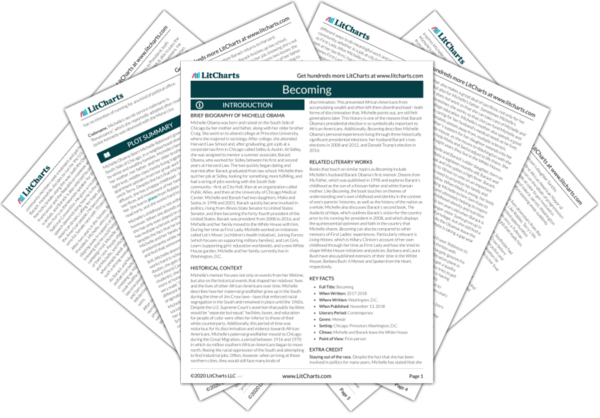The piano represents Michelle’s desire to work hard and overcome adversity with the help of caring adults. Michelle begins learning piano at age four from her great-aunt Robbie, who lives downstairs from Michelle and her family and teaches piano. Michelle constantly hears other students playing piano growing up, and when she is finally able to learn herself, she dedicates herself to practicing in order to get better. She is encouraged by the fact that the more she practices, the better she is able to play. And she is also excited to see the pleasure Robbie gets when Michelle can play a song without making a mistake. Thus, Michelle’s experience learning the piano sets up a maxim that Michelle returns to again and again: children will work hard if they feel like someone is invested in their success, and Michelle knows that she owes a lot to the fact that she had caring adults who encouraged her to work hard.
The piano also shows Michelle some of the inequality of the world. When she attends her first piano recital, she cannot find Middle C, because Robbie’s battered piano had a chipped Middle C that always helped Michelle find her place. When Michelle realizes this, she starts to panic, not knowing where to place her hands. This shows how, oftentimes, those who are at a disadvantage don’t know what they don’t know and have to work twice as hard to figure out how to put themselves on a level playing field—an idea that Michelle also understands when she attends Princeton. But during the recital, Robbie comes to rescue her and points out Middle C; Michelle regains her confidence and plays the piano perfectly. This episode reinforces the value of caring adults invested in the success of children, and how that care sets them up to want to work hard and succeed.
Piano Quotes in Becoming
I spent much of my childhood listening to the sound of striving. It came in the form of bad music, or at least amateur music, coming up through the floorboards of my bedroom—the plink plink plink of students sitting downstairs at my great-aunt Robbie’s piano, slowly and imperfectly learning their scales.

Unlock explanations and citation info for this and every other Becoming quote.
Plus so much more...
Get LitCharts A+The issue was that I wasn’t used to flawless. In fact, I’d never once in my life encountered it. My experience of the piano came entirely from Robbie’s […] less-than-perfect upright, with its honky-tonk patchwork of yellowed keys and its conveniently chipped middle C. To me, that’s what a piano was—the same way my neighborhood was my neighborhood, my dad was my dad, my life was my life. It was all I knew.












